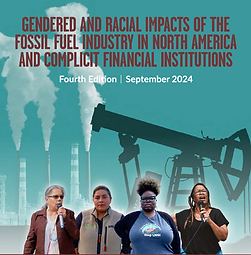Gendered and Racial Impacts of the Fossil Fuel Industry
in North America and Complicit Financial Institutions
The report, The Gendered and Racial Impacts of the Fossil Fuel Industry in North America and Complicit Financial Institutions (fifth edition), addresses the disproportionate gender and race-specific health and safety impacts as well as human and Indigenous rights issues of fossil fuel extraction and infrastructure in the United States— interlocking issues that have been sorely neglected in the discourse regarding fossil fuel extraction. The report highlights seven case studies in the United States exemplifying how fossil fuel pollution and infrastructure threatens the health and safety of Black, Indigenous, Latina, and low-income women in all of their diversity. The report spotlights the role that specific financial institutions, including banks, asset managers, and an insurance company, play in preserving and perpetuating negative gender and racial impacts through their financing, insuring, and investing in fossil fuel companies and projects.
WECAN is releasing the fifth edition of the report on September 18, 2025 ahead of Climate Week and concurrently with the UN General Assembly in New York City.
.png)
The Gendered and Racial Impacts of the Fossil Fuel Industry in North America and Complicit Financial Institutions (fifth edition) exposes the role that financial institutions, including banks, asset managers, and insurance companies, play in preserving and perpetuating negative gender and racial impacts through focusing on seven regional and project-specific case studies. From the LNG buildout in the Gulf South to the proposed Line 5 project in the Great Lakes, the report aims to bring attention to communities, and specifically women, impacted by fossil fuel pollution and infrastructure and the financial institutions responsible for financing, insuring, and investing in fossil companies and projects.
The report highlights Vanguard, BlackRock, JPMorgan Chase, Citigroup, Bank of America, and Liberty Mutual as primary investors, financiers, and insurers of harmful fossil fuel companies and projects within the regional and project-specific case studies. All six financial institutions have voiced support for or acknowledged the importance of the Paris Climate Agreement and made commitments to human rights standards via public statements or by signing onto national and international frameworks and initiatives. Yet, they continue to support companies whose operations disproportionately harm communities of color and Indigenous communities (and specifically women in these communities) while also threatening human rights and furthering the climate crisis.
The report outlines risks for financial institutions and recommendations for internal policy changes. Financial institutions are exposed to a myriad of physical and transition risks, including regulatory risks, market and credit risks, and reputational risks. The report details recommendations financial institutions need to adopt, including committing to immediately phasing out existing fossil fuel financing and adopting mandatory policies that uphold Free Prior and Informed Consent (FPIC) and human rights. To implement steps forward, the report also advocates for a Just Transition to a renewable and regenerative future that uplifts communities and women most impacted by environmental degradation, pollution, and the climate crisis.
In 2021, WECAN released the inaugural report. Following the first edition we released the second, third, and fourth editions in 2022, 2023, and 2024, respectively. For further inquiries contact katherine@wecaninternational.org.
As part of the launch of the fourth edition in 2024, WECAN hosted a powerful dialogue to hear from frontline women leaders, health experts, and advocates who are demanding accountability from financial institutions to take action for the health of our communities. The speakers shared powerful testimonies and experiences of how exactly fossil fuels are impacting the health and safety of women and their families and communities and described how financial institutions are complicit in these harms. Find a recording of the event on YouTube.
We are thankful for the following endorsements from the first edition of the report:
Alliance for Climate Education
BankTrack
Businesses for a Livable Climate
CADIRE Cameroom Association
Call to Action Colorado
Catholic Network US
Center for Common Ground
Clean Energy Action
Climate Crisis Policy
Climate Generation: A Will Steger Legacy
ClimateMama
Collectif Sénégalais des Africaines pour la Promotion de l'Education Relative à l'Environnement (COSAPERE)
Colorado Businesses for a Livable Climate
Extinction Rebellion Boston
Extinction Rebellion San Francisco Bay Area
Future Coalition
Global Choices
GreenFaith
Last Real Indians
Mazaska Talks
Movement Rights
NAACP Environmental and Climate Justice Program
Progressive Democrats of America
Rachel Carson Council
RapidShift Network
Rural Gender and Development Association (RUGADA)
Sebenza Enabling the Environment
Servicios Ecumenicos para Reconciliacion y Reconstruccion
Shipra
United People Project
UnKoch My Campus
Urgent Action Fund for Women's Human Rights
Wall of Women
Wen (Women's Environmental Network)
Women's Environment and Development Organization
XR-Boston
350.org
350Hawaii
350Kishwaukee










